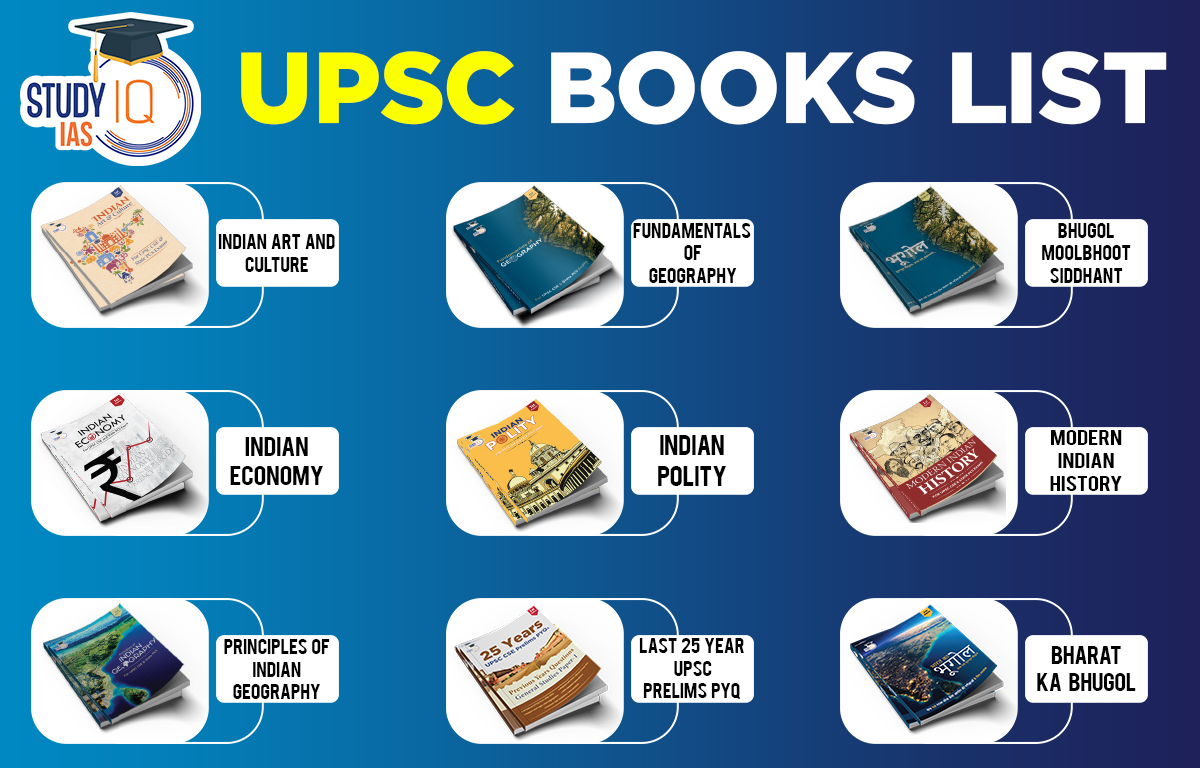Table of Contents
UPSC Books List
Civil Service Examination is conducted annually by UPSC for various Group “A” and Group “B” services of the Government of India. Every year, lakhs of aspirants appear for this exam, but only a thousand get selected. Those who succeed no doubt work harder, but they also have another thing in common. They read the right resources which cater to the demand of this examination. Experts suggest that there is no end to the UPSC Syllabus, one can only get hold of the syllabus by reading the right resources. Here is a comprehensive list of reading resources that an aspirant beginning his/her preparation must go through to build a strong foundation for their preparation.
UPSC Books StudyIQ Publication
We have been working in this field for years. We bring out our experience in a number of books under our StudyIQ Publication. Every year thousands of aspirants read them and get successful. These books have been crafted by experienced persons, designed and published in a manner that kindles aspirants’ interest in the subject. Here is the UPSC Book List of our publication.
| Subject | Active Links |
| History | Modern Indian History |
| Economy | Indian Economy |
| Art and Culture | Indian Art and Culture |
| Polity | Indian Polity |
| Geography | Fundamentals of Geography
Principles of Indian Geography Bhoogol Moolbhoot Siddhant (in Hindi) Bharat Ka Bhugol (in Hindi) |
| Previous Year Question Papers | 26 years UPSC CSE Prelims PYQs Book |
List of Books For UPSC Exam
In addition to the above book list, here is an exhaustive subject-wise booklist for UPSC CSE from the point of view of general studies. UPSC syllabus can broadly be classified into the following head:
| UPSC Syllabus Classification | ||||
| History – India and the world | Indian Society | Governance and Social Issues | Indian Economy | Internal Security |
| Geography – Physical and Human | Indian Constitution | International Relations | Environment and Biodiversity | Ethics and Integrity |
UPSC Books List Subject-wise
We are providing you consolidated comprehensive UPSC Books List as under:
UPSC Books for History
| UPSC Books for History | |
| Indian History |
|
| Post Independence History |
|
| World History |
|
UPSC Books for Geography
| UPSC Books for Geography | |
| Indian Geography |
|
| World Geography |
|
UPSC Books for Indian Society
| UPSC Books for Indian Society | |
| Fundamental books |
|
| Advanced Readings |
|
UPSC Books for Indian Constitution and Polity
| UPSC Books for Indian Polity | |
| Indian Polity |
|
| Governance and Social Issues |
|
| International Relations |
|
UPSC Books for Economics
| UPSC Books for Economics | |
| Fundamental books |
|
| Advanced Readings |
|
UPSC Books for Environment and Ecology
| UPSC Books for Environment and Ecology | |
| Environment and Ecology Books |
|
UPSC Books for Internal Security
| UPSC Books for Internal Security | |
| Internal Security Books |
|
Ethics UPSC Books
| Ethics UPSC Books | |
| Ethics Books |
|
UPSC Books for CSAT
| UPSC Books for CSAT | |
| CSAT Books |
|
UPSC Books List in Hindi
Most of the above books, particularly NCERTs are available in Hindi also. Please ask the seller for the same.
Read More: UPSC Syllabus in Hindi
Best Books for IAS Prelims and Mains
Systematic preparation for the UPSC exam should be done comprehensively. Both the Prelims Syllabus and the Mains Syllabus complement each other. Thus, the book list remains the same. However, based on previous years’ question papers, one must try to understand which topics of the same subject are important for prelims and which are important for mains. Nevertheless, a sound understanding of the subject with good conceptual clarity is the sine qua non for both stages of the exam.
The above booklist is in no way set in stone. One can always alter this with the resources one gets from trusted sources. However, over the years, many successful candidates have used them to prepare for this exam.
It must be noted that aspirants must keep their resources limited. It is always advisable to read the same resource multiple times rather than reading multiple resources hastily. Of course, selective reading of multiple resources is always welcome to gain conceptual clarity on certain challenging topics.
Simultaneously, the aspirant must always regularly read the newspaper and try to relate the current happenings with the fundamentals he/she is reading in standard books.


 10 Years of Pradhan Mantri Mudra Yojana ...
10 Years of Pradhan Mantri Mudra Yojana ...
 IIT Delhi expert Committee to Boost Stud...
IIT Delhi expert Committee to Boost Stud...
 Daily Quiz 08 April 2025
Daily Quiz 08 April 2025





















